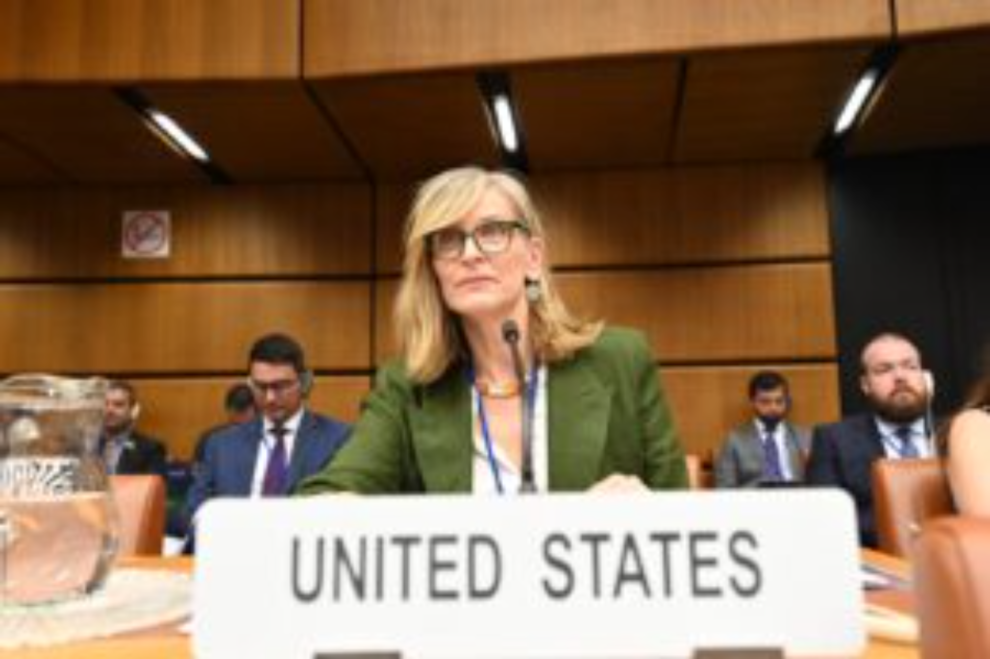U.S. Statement as Prepared for U.S. Representative Valda Vikmanis-Keller – Agenda Item 8 – Space and Sustainable Development
Vienna, Austria, June 2, 2023 . Chair, the United States appreciates the opportunity to highlight the fundamental relationship between student engagement and sustainable development, and is leading efforts to inspire interest in science, technology, engineering, and mathematics (or “STEM”). In addition to its unique space missions, research, and innovations, NASA is observing the Year of Open Science by expanding STEM awareness and learning by actively engaging students, and educators in STEM activities, with a special focus on under-represented student communities, and by developing a wide number of STEM educational resources, which are online, free, and instantly available for anyone to use.
Within NASA, the Office of STEM Engagement leads the work to provide student learning opportunities and experiential work assignments throughout the year, by offering NASA internships, fellowships, and student challenges and competitions. Foreign students, funded by foreign partners, sometimes join U.S. students in participating in these activities. NASA also gives direct support to American colleges and universities to strengthen their research and development capacity and enables faculty and educators to meet and access NASA’s science and technology personnel and facilities.
NASA produced a variety of resources to help educators excite the Artemis Generation about humanity’s return to the Moon. The Artemis Camp Experience Guide, a set of hands-on activities telling the story of the Artemis missions, reached more than 100,000 people. Through the Artemis Generation Spacesuits and Build, Launch, Recover educator guides, students will learn all about the development of spacesuits and find out how NASA prepares for launch and recovers the spacecraft when a mission successfully ends.
Among the United States contributions to the SDG Actions, NOAA and NASA are pleased to be partners in the World Meteorological Organization (WMO) SDG Action for enhancing earth system observations, monitoring and forecasting for floods and droughts to ensure early warnings for all. This Action will contribute in reducing the number of deaths and the number of people affected and substantially decrease the direct socio-economic losses from the water-related disasters, with a focus on protecting the poor and people in vulnerable situations (SDG 11.5).
Chair, the United States would also take a moment to underscore the view that space science and technology applications are essential to addressing current and future challenges and realizing the Sustainable Development Goals. It is only through continued and purposeful international collaboration that we can leverage our shared strengths to fully realize the potential impact Earth observations can have in our work. In the U.S. Department of State’s “Strategic Framework for Space Diplomacy,” released earlier this week, we explicitly note the importance of sharing government Earth observation data internationally to support “disaster management, climate change mitigation and adaptation, and economic development. Satellite Earth observations deliver a unique view of our world and provide substantial amounts of data that facilitate new methods and insights into the Sustainable Development Goals and their Indicators.
To further advocate and realize these contributions, the United States works with established international forums such as the Group on Earth Observations (GEO) which launched a dedicated Initiative, Earth observations for the Sustainable Development Goals (EO4SDG). The United States, through NASA, the National Oceanic and Atmospheric Administration (NOAA), and United States Geological Survey (USGS) work to employ Earth observations in smart practices and solutions on the use of this data in planning, tracking, and reporting. This includes GEONETCast Americas, a user-driven, user-friendly and low-cost information dissemination service providing global information as a basis for sound decision-making in a number of critical areas such as biodiversity and ecosystem sustainability, disaster resilience, food security and sustainable agriculture, and sustainable urban development among others.
The United States’ work utilizing Earth observations for this goal is further enhanced by the Committee on Earth observation Satellites (CEOS), whose purpose is to ensure international coordination of civil space-based Earth observation programs. CEOS, alongside the Group on Earth Observations, jointly authored the report “Earth Observations in Support of the 2030 Agenda for Sustainable Development”, which highlights the potential role of Earth observations in supporting the global Indicator framework. The United States believes that a successful sustainable development agenda will require effective partnerships, such as these, for implementation.
I am also pleased to announce that NASA, the U.S. Mission to the International Organizations in Vienna, and UNOOSA are joining forces to hold a hackathon-style competition in early 2024 to encourage programmers, scientists, entrepreneurs, and policymakers to make use of the freely available earth observation data to develop applications in support of the sustainable development goals.












Add Comment